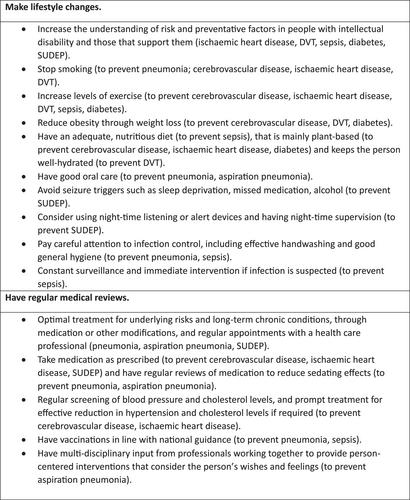We now have sufficient evidence demonstrating inequalities in specific avoidable causes of death for adults with intellectual disability compared to their peers without intellectual disability. Apart from covid-19, the largest differentials that disadvantage people with intellectual disability are in relation to pneumonia, aspiration pneumonia, epilepsy, cerebrovascular disease, ischaemic heart disease, deep vein thrombosis, diabetes and sepsis. The aim of this systematic review is to report on strategies at the individual, population or policy levels aimed at preventing these conditions that are applicable to adults with intellectual disability and that have been based on or recommended by research.
Systematic review of PUBMED, EMBASE, CINAHL, PsychInfo, Social Care Online, International Bibliography of the Social Sciences (IBSS), Web of Science, Scopus, Overton, the Cochrane Library and Google Scholar databases was carried out. Searches were completed on 30 June 2023. Quantitative, qualitative and mixed-methods research; systematic, scoping or evidence-based reviews; and audit and reports of mortality reviews were included. Publications included in the review were about preventing the eight potentially avoidable causes of death.
Ninety-four papers were included in the review (9 in relation to pneumonia; 11 for aspiration pneumonia; 18 for sudden unexpected death in epilepsy; 7 for cerebrovascular disease; 8 for ischaemic heart disease; 4 for deep vein thrombosis; 31 for diabetes; 6 for sepsis). The eight most frequently occurring potentially avoidable causes of death in people with intellectual disability are very different medical conditions, but they shared striking similarities in how they could be prevented. The literature overwhelmingly implicated the need to make lifestyle changes to address obesity, lack of exercise and poor nutrition, and to have regular medical reviews. In addition, ‘whole-population’ approaches are required that look beyond the individual to the social determinants of health.
We found little peer-reviewed evidence specifically about preventing these conditions in people with intellectual disability. However, most of the literature about preventative strategies pertaining to the general population was applicable to people with intellectual disability, albeit that some ‘reasonable adjustments’ would be required.



